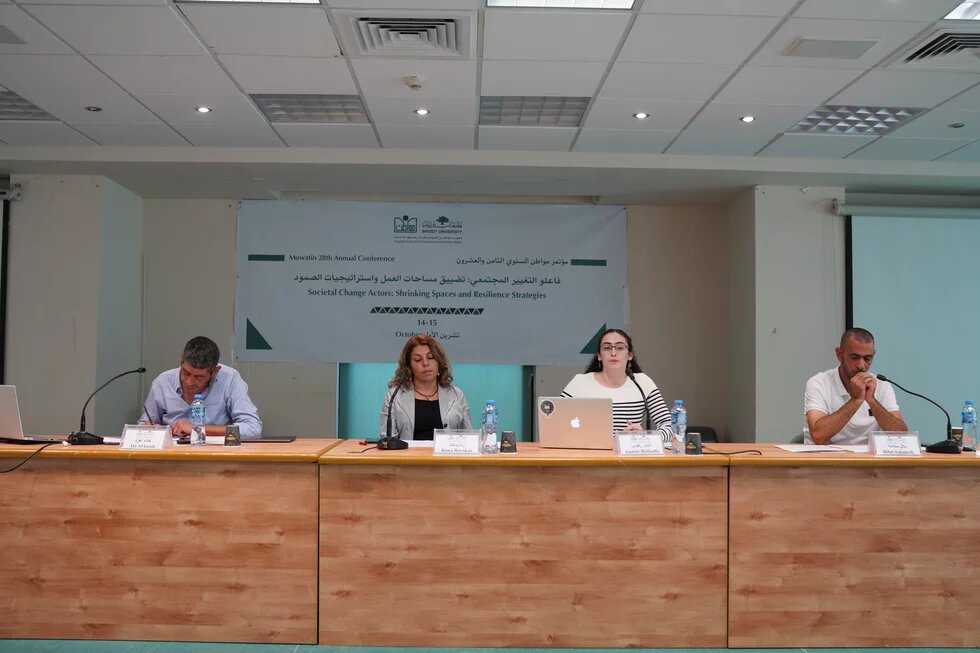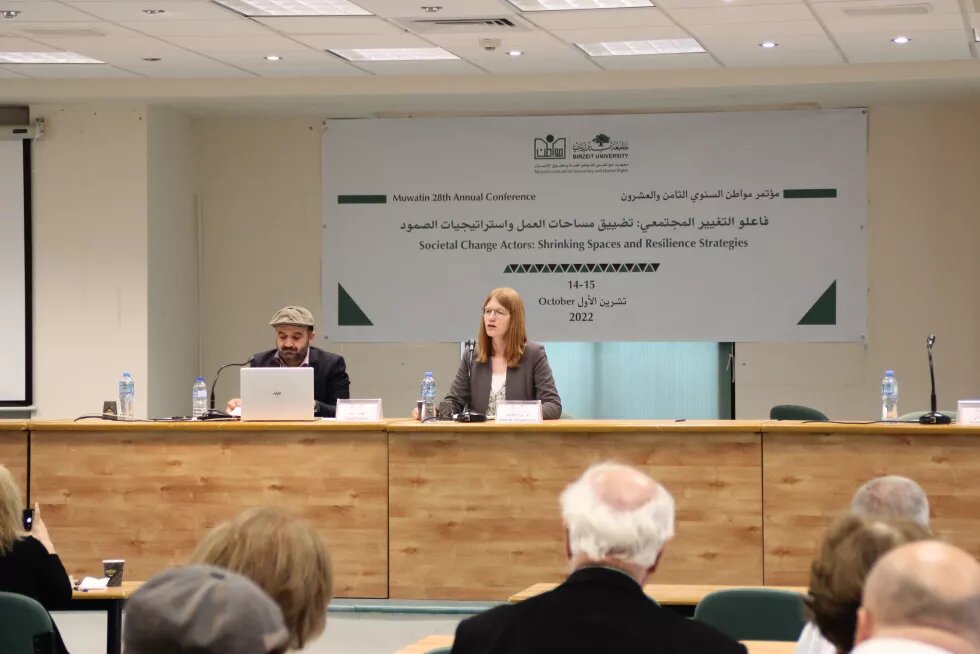
How can we conceptualize the spaces for societal change actors as well as societal change within the public sphere? What are the limits of and resilience strategies for societal change actors in a context of shrinking spaces in Palestine and beyond?

These and other questions were discussed during the 28th Annual Conference of Muwatin Institute for Democracy and Human Rights titled “Societal Change Actors: Shrinking Spaces and Resilience Strategies.” The hybrid-format conference, held on 13 and 14 October 2022 at Birzeit University, was organized in cooperation with the Heinrich-Böll-Stiftung - Palestine and Jordan, with the participation of several Palestinian and international academics and researchers. The conference addressed the issue of shrinking spaces for societal change actors, resilience strategies and attempts at the Palestinian, regional and global levels. It also shed light on spaces and frameworks of societal work in Palestine and beyond and on mechanisms for enhancing resilience strategies, through practical issues and case studies.
In the opening speeches of the conference, Dorthe Siegmund, Office Director of the Heinrich-Böll-Stiftung - Palestine and Jordan, welcomed the participants and stressed the importance of the topics raised. She highlighted the work carried out by civil society institutions on the issues of social justice, human rights, democracy, political and public participation, in contrast to global policies that are shrinking the spaces of societal change, as a growing trend. Consequently, societal actors, such as NGOs, are coming more and more under pressure and facing severe obstacles in their work. She emphasized the importance of discussing resilience strategies; how to deal with these difficult challenges and how societal actors are able to continue with their important work in the future. In the Israel-Palestine context, restrictions on civil and political rights, such as the freedom of expression, association and peaceful assembly, and the right to public participation are on the rise. At the same time, NGOs and individual activists and human rights defenders are faced with defamation claims designed to intimidate and silence them. She underlined, that civil society could only develop its potential if it has sufficient social and legal scope for action.
Dr. Jamil Salem, Director of Muwatin and the Chairman of the Conference Committee, pointed out that the topics of the conference revolved around societal organization by focusing on the workspaces for social change actors within the public space, in an effort to answer several questions about the possibility of social and political organization in light of neoliberal policies, the control of individualist values and other challenges. He added that social and political movements are subjected to blackmail, repression, restriction and suffocation in most countries. The conference sessions attempt to present a set of cases and initiatives seeking change that raise questions about the tools of rebellion and steadfastness, in light of the prevailing authoritarian and neoliberal practices in many countries of the world.
Papers and case studies from Palestine, Lebanon, Chile and Columbia shed light on issues of repression of the state, suppression by security forces, restrictions by the occupation, donors and the Palestinian Authority, rising neoliberal policies and populist governments, and the impact of the control of international and transnational institutions that contribute to shrinking societal spaces.
The first day was structured in three sessions. The first session looked at societal change actors and the realm of change from theoretical and practical perspectives. Session two then dived into Palestinian experiences and provided examples of change actors from Jenin and the Gaza Strip. The virtual evening session focused on liberation and social movements in both Palestine and Chile, presenting challenges, activism and lessons from both contexts.
On the second day, the focus shifted to the challenges of narrowing spaces in Palestinian unionism and the mobilization of the middle class. The 5th session “Paradoxes of Public Sphere Interactions” tackled the ineffectiveness of working for change in the Palestinian case and unions as a public sphere. In the 6th session, “Steadfastness and Alternative Strategies for Emancipating the Public Sphere”, the discussion continued with focus on social movements and mechanisms of success. The closing session, titled “Dynamics of Struggle in the Public Sphere”, the subject of discussion was the shrinking space for civil society to affect global human rights treaties in case of human rights violations in Palestine. Furthermore, experience from Colombia brought in new perspectives on Agro-alimentary territories across Latin America. Those are a social, communitarian and political processes of self-organization as a response to the struggle for food sovereignty, land, water, sovereignty and the defense of territories.
To learn more about the conference and topics raised, see the Conference Documents (Concept note, abstracts, program, and participants).